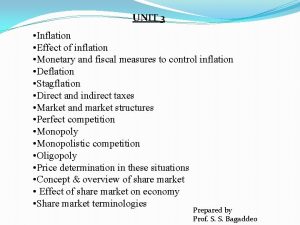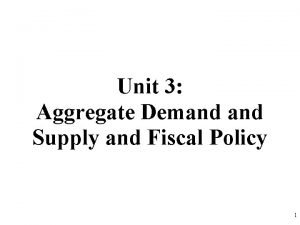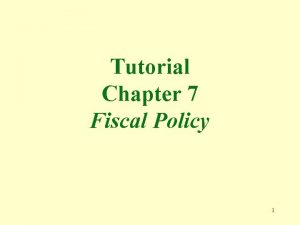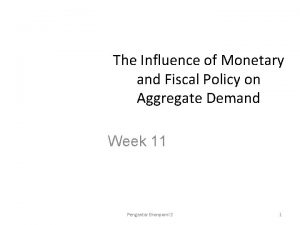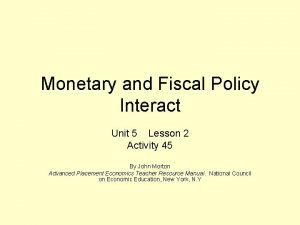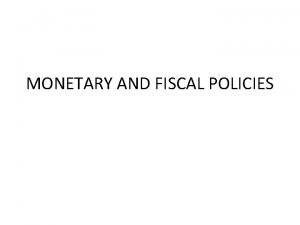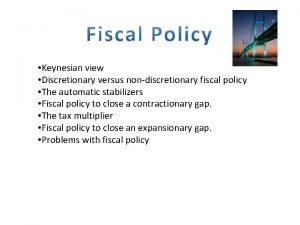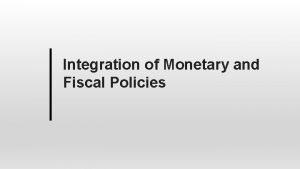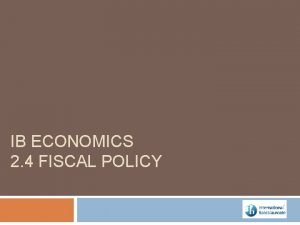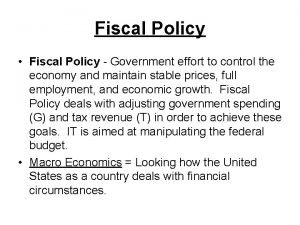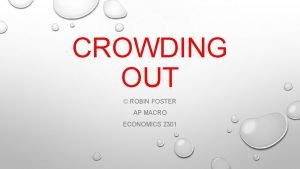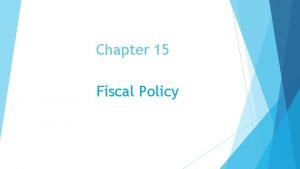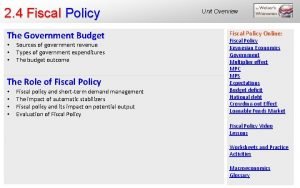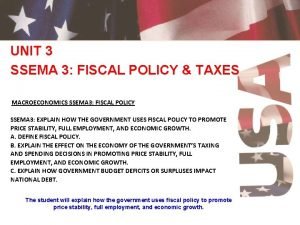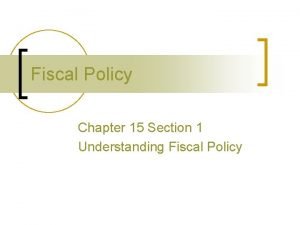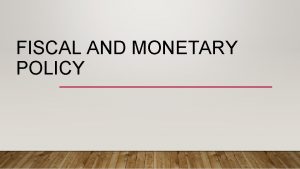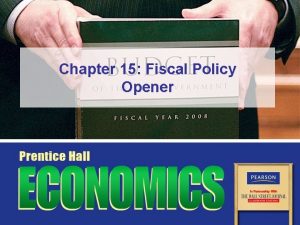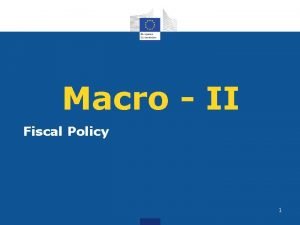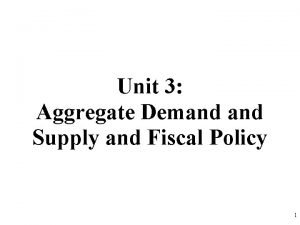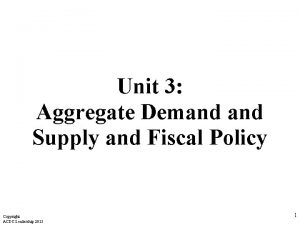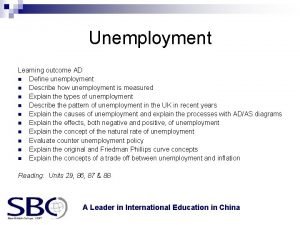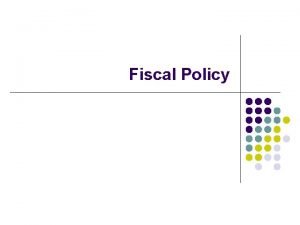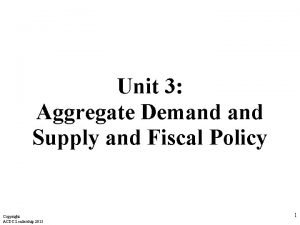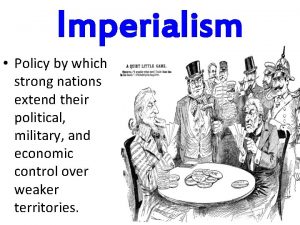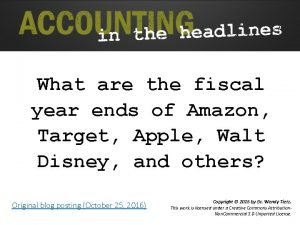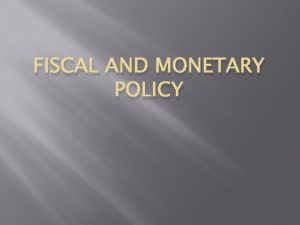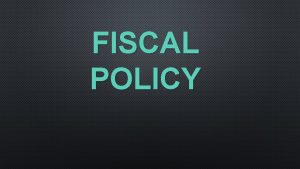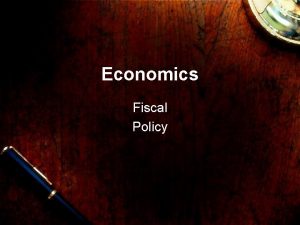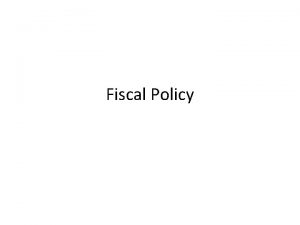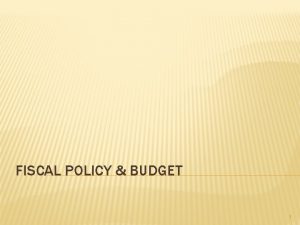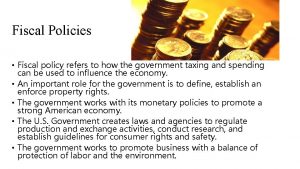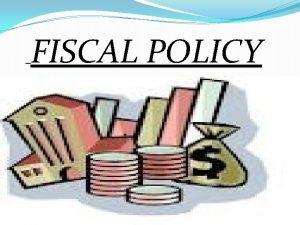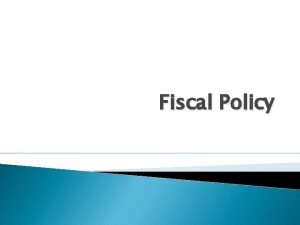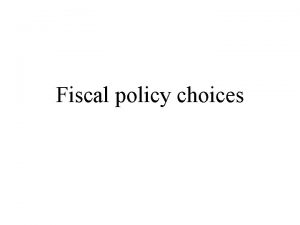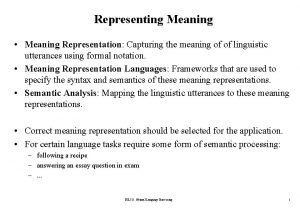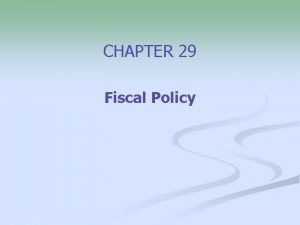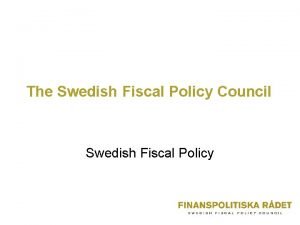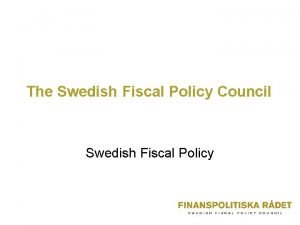Fiscal Policy Meaning Of Fiscal Policy It refers




































- Slides: 36

Fiscal Policy

Meaning Of Fiscal Policy “It refers to a policy concerning the use of state treasury or the government finances to achieve the macro-economic goals” or “Government policy of changing its taxation and public expenditure programmes intended to achieve its objective”. or “Government uses its expenditure and revenue program to produce desirable effects on National Income , production and employment”.

Counter Cyclical Fiscal Policy Fiscal or Budgetary Policy: Are the Revenue and Public Expenditure Policy l It is based on the relationship between them l It generates additional purchasing power during depression l Contracts purchasing power during expansion

Importance of Fiscal Policy l Government activities are enlarged. l Tax- Revenue and Expenditure accounts for large proportion of GNP. l Government effects the Economic activities through gap between government receipts and borrowings. l It indicates the level of overall borrowings by the government. l It is the indicator of fiscal health of the economy.

Objectives of Fiscal Policy l To mobilise resources for Economic Growth l To promote growth in Private Sector l Equitable distribution of Income and wealth l Restrain inflationary forces in the Economy

Tools of Fiscal Policy Public Revenue Receipt Tax Direct Tax Capital Receipt Non- Tax Indirect Tax Public Expenditure Revenue Expenditure Capital Expenditure

Public Expenditure (Payments) l Revenue Expenditure l l l Interest Payments Major Subsidies Defense l Capital Expenditure l l l Expense on administration Repayment of Loans Extension of fresh loans to the state govt by the central Loans to public enterprise Expense on Irrigation project Sectoral development

Public Revenue (Receipts) l Revenue Receipts l Tax l Capital Receipts l l l Non- Tax Receipts l l l Fines and Penalties Fees Profits of PSU Govt Interest Grants and Gifts l Recovery of Govt loans Disinvestment of PSU Market Borrowings – Internal and International sources

Public Revenue (Receipts) l Direct Tax l l Income Tax Corporate Tax Wealth Tax Gift Tax l Indirect Tax l l Sales Tax Excise Tax Custom Service Tax

Effect of Public Expenditure on the Economy Public Expenditure l l An increase in PE raises the level of GNP. PE increases the purchase of goods and services § Increases household incomes § Increases Govt Indirect tax revenues Increase the flow of funds in the economy Increases private Income and thereby the Private Expenditure

Effect of Public Revenue on the Economy Public Revenue l l l Total amount received. Taxation is a measure of transferring funds from private purses to the public coffers. Withdrawal of funds from the private use. Has a deflationary impact on GNP Reduces Disposable income and reduces private expenditure

Concept of Deficit: Total government expenditure is more than government receipts. Budgetary Deficit: Total Expenditure – Total Revenue Deficit: Revenue Expenditure – Revenue Receipts Fiscal Deficit: Total Expenditure – Total Revenue (Excluding Govt Borrowing) Primary Deficit: Fiscal Deficit – Interest Payments

What is Fiscal Deficit? l Fiscal deficit: Is the difference between what the government spends and what it earns. It is expressed as a percentage of GDP. l India's fiscal deficit was brought down to 3. 17% (Rs 1, 43, 653 crore) of the gross domestic product in 2007 -08 from 3. 8% in 2006 -07. l The government has promised to cut the deficit further to 2. 5% of GDP (Rs 1, 33, 287 crore) by the end of 2008 -09,

Q 1 Receipts & Expenditure of the central Govt S. No Item 1996 -97 1997 -98 1998 -99 1 Revenue Receipts 1, 26, 279 1, 33, 886 1, 49, 510 a) Tax Revenue 93, 701 95, 672 1, 04, 652 b) Non- Tax Revenue 32, 578 38, 214 44, 858 2 Revenue Expenditure 1, 58, 933 1, 80, 336 2, 17, 419 a) Interest Payments 59, 478 65, 637 77, 882 b) Major Subsidies 14, 041 18, 248 21, 269 c) Defence Expense 20, 977 26, 174 29, 861 3 Revenue Deficit (1 -2) 32, 564 46, 450 67, 909 4 Capital Receipt 50, 872 82, 435 1, 06, 824 A Recovery of Loan 7, 540 8, 310 10, 633 B Other Receipt ( PSU disinvestment) 455 912 5, 874 c Borrowing and Other Liabilities 42, 877 73, 205 90, 922 5 Capital Expenditure 31, 403 35, 985 38, 920 6 Total Receipts ( 1+ 4) 7 Total Expenditure 8 Fiscal Deficit ( 1 + 4 a + 4 b – 7) 9 Budget Deficit ( 6 -7) 13, 185 Nil 10 Primary Deficit ( 8 - 2 a)

Q 2 Receipts & Expenditure of the central Govt S. No Item 2004 -05 2005 -06 1 Revenue Receipts a) Tax Revenue 2, 24, 857 2, 73, 466 b) Non- Tax Revenue 80, 330 77, 734 2 Revenue Expenditure 3, 84, 745 4, 46, 512 a) Interest Payments 1, 26, 540 1, 33, 945 b) Major Subsidies 44, 633 46, 358 c) Defence Expense 43, 967 48, 625 3 Revenue Deficit (1 -2) 4 Capital Receipt 1, 93, 261 163, 144 A Recovery of Loan 60, 862 12, 000 B Other Receipt ( PSU disinvestment) 4, 424 0 5 Capital Expenditure 1, 13, 703 67, 832 6 Total Receipts ( 1+ 4) 7 Total Expenditure 8 Fiscal Deficit 10 Primary Deficit ( 8 - 2 a) Calculate – Revenue Receipt, Revenue Deficit, Fiscal Deficit?

Kinds of Fiscal Policy Discretionary Fiscal Policy Anti- Recessionary Fiscal Policy Non- Discretionary / Automatic Fiscal Policy Anti – Inflationary Fiscal Policy

Discretionary Fiscal Policy 1. Anti –Recessionary Fiscal Policy Aggregate Demand Decreases Private Investment Fall Deflationary Gap

Anti- Recessionary Fiscal Policy Increase In Govt Expenditure Reduction In Taxes

a) Increase In Govt Expenditure How does Govt increase Expenditure? 1. Public Works Building roads, dams, ports, telecommunication links, irrigation works, electrification of new areas etc… 2. Govt buys various types of goods and materials 3. Employ Labour

What is going to be the effect? a) Direct Effect l Increase in Income of suppliers and sellers l Increase in demand for capital good b) Indirect Effect l Consumption Increases l Increase in demand for consumer goods l Expansion in output l Generates Employment and Income How large should be the increase in expenditure? “Magnitude of GNP gap caused by the deflationary gap. ”

How to finance Govt Expenditure or Budget Deficit ? a) Borrowing 1) Market Loans and Borrowings 2) Small Savings Govt Borrowing is anti - inflationary l Borrow from the public l Govt competes with the businessman ( private investment) l Govt demand will raise the demand for loans l Raise the rate of interest l Will reduce pvt investment b) Creation of New Money- Deficit Financing l Will not reduce pvt investment l Full expansionary rise in govt expenditure can be realised “Monetisation of Budget deficit”

b) Reduction in Taxes What is going to be the effect? l l l Increase in the Disposable Income Increase in Consumption Employment will increase National Income and output Lead to increase in “Budget Deficit” Need to be financed by Borrowing or Creation of Money.

Deficit Financing and Inflation l Countries (Developing) need to promote Economic Growth. Resources required for development exceeds the amount which can be raised by normal ways: taxation, borrowing, surpluses etc. Economic development can be achieved by Investment. For Investment Govts needs to resort to Deficit Financing. l Does Deficit Financing leads to Inflation? l l l “NOT NECESSARY” l If the supply of output (Consumer goods) is also increasing with demand l But in short run it might turn inflationary in developing economies as there is dearth of capital and long term Investment projects does not add to supply of consumer goods.

Policy Option What is better Govt Expenditure or Taxes for stabilization? l l Depends on the Role of Public Sector. If Public sector can overcome the failure of free market system. However Public sector are inefficient and involves waste of scarce resources then Taxation are better options. Also depends upon the magnitude of effect of Expenditure and Tax Multiplier.

2. Anti –Inflationary Fiscal Policy Aggregate Demand Increases Private Investment Rises Inflationary Gap

Anti-Inflationary Fiscal Policy Reducing Govt Expenditure Increase In Taxes

a) Reducing Govt Expenditure How does Govt reduce Expenditure? l l l Reducing expenditure on non-development or unproductive heads like Defense, Subsidies, transfer payments Decrease in income Reduces excess demand

b) Increasing Taxes What’s going to happen? l l Increase in Taxes (income, wealth, corporate) Reduces the disposable income Consumption reduces Aggregate demand reduces Leads to increase in “Budget Surplus”

Disposing Of Budget Surplus 1) Retiring Public Debt l Pay back the outstanding debt l Would weaken its anti-inflationary effect l Add money supply to the public l Public will spend money l Increase consumption demand l Expansion of money supply would lower rate of interest 2) Impounding of Public Debt l Surplus to be kept idle

Non- Discretionary Fiscal Policy Taxes and Expenditure vary automatically with changes in National Income. With built in stabilizers recession and inflation will be shorter and less intense. l l 1) Personal Income Taxes l l l Direct relationship in between tax revenue and level of income Higher National Income, citizen have to pay higher taxes, which reduces the disposable income and the consumption demand. Fall in national income in recession, lower taxes but aggregate demand does not fall. 2) Corporate Income Taxes l l l Companies pay percentage of profits as tax. Revenue rises during inflation which reduces aggregate demand. Revenue falls in recession which tend to offset the decline in demand.

Non- Discretionary Fiscal Policy 3) Transfer Payments ( Unemployment & Welfare benefits, subsidies, ) l l l It’s a fiscal instrument which redistributes income in favor of poor. In recession Transfer Payments increases, Govt Expenditure increases and increases aggregate demand In prosperity phase, transfer payments decreases, reduces demand inflation. 4) Corporate Dividend Policy l l l Corporate follow a stable dividend policy Permits individual to spend more during recession Less during prosperity phase Success of this largely depend upon tax compliance, honest declaration of income, a stable dividend policy and transparent economic system.

Implication of Large Fiscal Deficit Borrow from within and outside the country Leads to increase in public debt and its burden 1) 2) Financing through Deficit financing Leads to creation of Money and may lead to rise in prises or Inflation 3) Adversely effects Economic Growth l Due to large revenue deficit a smaller amount are left for productive investment in Infrastructure and social capital (education and health) l More borrowing by Government leaves less resources for Private sector Investment.

What should Govt do? l In India, to reduce Fiscal Deficit the Govt has been curtailing Capital Expenditure. l But it effects the Economic Growth l The Govt needs to cut Revenue Expenditure and raise Revenue receipts ( mobilising Taxation)

FRBM – Fiscal Responsibility and Budget Management Fiscal Deficit 2008 -09 : 6. 4% Revenue Deficit 08 -09: 4. 5%


 Büdcə vergi siyasəti
Büdcə vergi siyasəti Demand pull inflation
Demand pull inflation Example fiscal policy
Example fiscal policy Fiscal policy practice
Fiscal policy practice Components of fiscal policy
Components of fiscal policy Crowding out effect of fiscal policy
Crowding out effect of fiscal policy Expansionary fiscal policy graph
Expansionary fiscal policy graph What is liquidity ratio in banking
What is liquidity ratio in banking Expansionary gap
Expansionary gap Instruments of fiscal policy
Instruments of fiscal policy Fiscal policy ib economics
Fiscal policy ib economics Fiscal demand side policy
Fiscal demand side policy Fiscal policy to control inflation
Fiscal policy to control inflation Types of fiscal policy
Types of fiscal policy Instruments of fiscal policy
Instruments of fiscal policy Crowding out effect
Crowding out effect Demand side fiscal policy definition
Demand side fiscal policy definition Short run effects of expansionary monetary policy
Short run effects of expansionary monetary policy Crowding out effect of fiscal policy
Crowding out effect of fiscal policy Example of expansionary fiscal policy
Example of expansionary fiscal policy Iousa worksheet
Iousa worksheet Goals of fiscal policy
Goals of fiscal policy Fiscal vs monetary policy
Fiscal vs monetary policy Goals of fiscal policy
Goals of fiscal policy Fiscal policy
Fiscal policy Aggregate supply shifters
Aggregate supply shifters Tax multiplier formula
Tax multiplier formula Unemployment
Unemployment Conclusion of monetary policy
Conclusion of monetary policy Fiscal policy definition
Fiscal policy definition Meaning
Meaning Unit 3 aggregate demand aggregate supply and fiscal policy
Unit 3 aggregate demand aggregate supply and fiscal policy Queen liliuokalani
Queen liliuokalani Apple fiscal calendar
Apple fiscal calendar Utsa marketplace
Utsa marketplace Unidad educativa fiscal provincia de loja
Unidad educativa fiscal provincia de loja Llena la tabla adjunta de la siguiente manera:
Llena la tabla adjunta de la siguiente manera:

